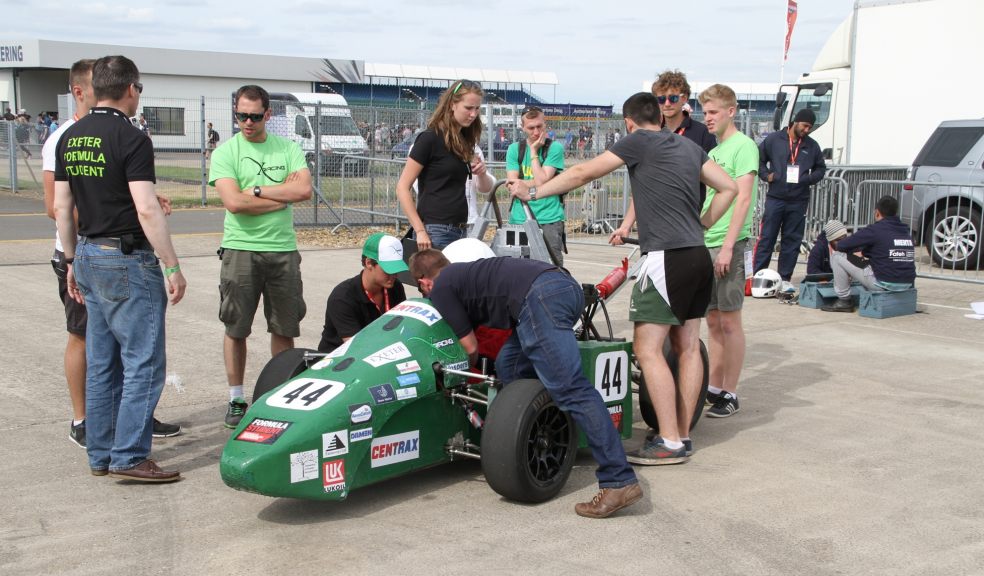
Exeter's Soul of a New Machine - Formula Student 2015
Exeter’s Engineering students can be forever proud as the future carriers of the torch of Britain’s manufacturing heritage – for without engineers, Britain’s future to compete on the World’s stage will remain bleak.
To be frank, it is a luxury to study some less intellectually challenging subject but a real endurance and test of conviction to study engineering. The subject takes no prisoners and Exeter University certainly sets a very high standard in academic achievement. Nevertheless, engineering is about implementation and solving real problems: boldly stepping up to the plate and facing the challenge. With sheer drummed-in self-belief, no fear of failure, and a relentless determination to deliver, when the going gets tough, look around – for after the droves have fled, the last ones still standing will be the engineers.
Education in this country is struggling to motivate future engineers. Tuition fees present a real challenge to inspire the right mix of educated graduates, for it is the same cost to get an Arts degree in History of Renaissance Art as it is to study engineering. Does Britain’s economy need another 5000 graduates in Renaissance Art History, or another 5000 engineering graduates?
Schools don’t teach engineering – little on the school syllabus these days teaches young persons the essential mindset of product design, product development, how to nurture entrepreneurial spirit, or how to build a machine. For it is here where Britain will gain the most, yet you will find years on the school curriculum dedicated to history, art and even much on the renaissance. Yes, art is inspiring and brings intellectual stimulation through expression – but to be honest, it doesn’t serve a national economy, it doesn’t drive up our GDP or help our balance of trade surplus. If the government cared about that, there would be a sensible overhaul of the education system. If you wanted more engineering graduates then you would motivate the entry by reducing the fees and not giving equal weight to the less economically useful arts subjects. Oh right, George Osborne studied history and David Cameron studied Philosophy, Politics and Economics. You draw your own conclusions.
This weekend, one of the greatest events on the stage of engineering took place – Formula Student 2015 at Silverstone and Exeter University mechanical engineering students were flying the flag – your flag, the flag of engineering excellence. Some 180 University teams from all over the world were there – teams included entries from Sweden, Belgium, The Netherlands, Germany, Switzerland, Norway, and Austria to name but a few. In fact, virtually every University seriously interested in standing on the World stage were fielding a team. This event has been running around 15 years and this is the first year that Exeter’s team reached the Formula Student event at Silverstone. So how did Exeter’s Xracing Team do?
Well, wait a moment . . . I’ll just describe the lay of the land. Last year’s winning Dutch team from Delft Technical University, who won in 2014 with their €1M electrical car, were also competing this year – complete with a trailer workshop. Many German and Swiss entries exceeded project costs of €500k, fully supported by healthy investments from their Universities. Clearly these universities understand the huge prestige that such an event on the World mechanical engineering stage brings for their engineering departments. So how much funding and support did Exeter University give to this event – to demonstrate its dedication to the support of the faculty to attract future engineering students?
Sadly, Exeter University gave no funding, no support, no marketing, no promotion, . . .de nada! In fact, the Mechanical Engineering faculty either did not appreciate the true significance of this event or perhaps forgot to speak to the Electrical Engineering department to deliver the essential electronics competence needed. If Exeter University does not appreciate the absolute importance of participation and achievement in this World stage event - as a measure of an important dimension of its own mechanical engineering competence - then there is need for some serious reflection.
But wait . . .. Despite a total lack of essential support and out of nothing but an engine block and £30,000 - which the team raised privately to cover essential costs – Exeter’s Xracing team built an entire racing car. Unlike other teams who were perfecting the previous year’s entry and getting expensive outsourced component manufacturing for free, Exeter’s Xracing team built the entire racing car from absolutely nothing.
Through sheer determination they built an entire racing car and arrived at Silverstone and passed the rigorous 4-hour design integrity checks of the Silverstone Scrutineering stage. After breezing past the business case evaluation stage they passed the structural integrity tilt test. In the fading hours of Saturday an electrical component failed and the team was fully hands on to overcome the problem – which they did.
Against all odds, Exeter’s Xracing team achieved position 87/180. This is an amazing result for which everyone can be proud.
In years to come, records will show how Exeter University achieved position 87 in Formula Student 2015, but please remember that the soul of the machine truly lay in the spirits of these young engineers and that all praise should go to their individual endeavours. We congratulate them and hope that their fantastic achievement will secure a real and immediate change of heart of Exeter University towards better supporting its own engineers in such a hugely significant event from now on – bravo!














